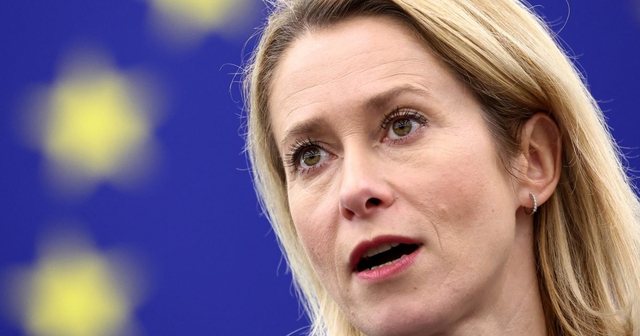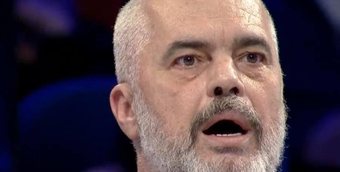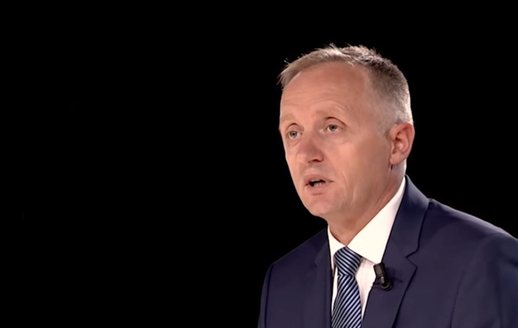
Kallas to REL: Kosovo-Serbia dialogue has stalled, we are considering other means for normalization


The European Union is interested in the normalization of relations between Kosovo and Serbia, whether through dialogue or some other instrument, said the European Union's foreign policy chief, Kaja Kallas, in an interview with Radio Free Europe.
"Maybe it's dialogue, maybe it's another tool. I am ready to explore this issue, and I will do so together with the Special Representative in the coming days," said Kallas, who is expected to visit the Western Balkans next week.
Kallas also spoke about the potential impact of the trade war between the EU and the United States of America, as well as the possibility of a ceasefire in Ukraine, emphasizing the need for Europe's involvement in any negotiations on this issue.
Radio Free Europe: New [United States] tariffs of 25 percent on automobiles go into effect today. How will the European Union respond, and what do you think this says about transatlantic relations?
Kaja Kallas: So far, our trade people are interacting with the Americans, so they don't know exactly what is coming. There are statements that we see, but what are the real actions? If such action comes, we also have a plan ready, but what I want to emphasize is that there are no winners in trade wars.
In the end, prices go up and consumers pay more for these products, and that's not a smart move. So I still hope we don't start this trade war.
Radio Free Europe/Radio Liberty: [Finnish President] Alexander Stubb, when he was in America recently, spoke about a possible full ceasefire in the war [between Ukraine and Russia] on April 20. Do you think that is feasible?
Kaja Kallas: So far, Ukraine has agreed to a ceasefire three weeks ago, and we haven't seen any positive signs from Russia. They're just playing games.
I think it would be great to give them a clear deadline by which they have to respond, state their position, and show goodwill that they want peace.
It's clear that Ukrainians love him.
Radio Free Europe/Radio Liberty: [Kirill] Dmitriev, one of the Kremlin's negotiators, is expected to visit Washington soon. Would you like to talk to him? Do you think the EU should negotiate with him?
Kaja Kallas: For Ukraine, Ukraine must negotiate with Russia. This cannot be done by anyone else, because it is about Ukraine and it cannot be done without Ukraine.
Mendoj se kjo është jashtëzakonisht e rëndësishme. Kur bëhet fjalë për sigurinë evropiane, sigurisht që duhet të diskutojmë mes nesh dhe me aleatët tanë për mënyrën se si ta rregullojmë këtë çështje.
Radio Evropa e Lirë: Por, a është BE-ja apo ndonjë vend evropian i gatshëm të diskutojë drejtpërdrejt me Moskën?
Kaja Kallas: Kur bëhet fjalë për negociatat reale që lidhen me Evropën, mendoj se është e rëndësishme të kemi parasysh se Rusia nuk duhet të ketë ndikim mbi mënyrën se si ne organizojmë sigurinë tonë, sepse Evropa nuk po e sulmon Rusinë. Përkundrazi, Rusia ka sulmuar fqinjët e saj, prandaj ne po diskutojmë rreth aranzhimeve tona të sigurisë.
Megjithatë, sa i përket negociatave për Ukrainën, është e qartë se Evropa duhet të jetë pjesë e tryezës, sepse rezultati i tyre na prek edhe neve. Dhe, çdo marrëveshje nuk mund të funksionojë pa zbatimin e saj nga ana e evropianëve.
Radio Evropa e Lirë: Pra, a do të flisni për këtë me [sekretarin amerikan të Shtetit, Marco] Rubio, kur ai të jetë në Bruksel ditët në vijim?
Kaja Kallas: Ne kemi folur për këtë edhe më parë, kur kishim takimet në kuadër të G7-tës në Kanada, dhe padyshim që do të flasim për këtë sërish. Është shumë e qartë se çfarë ka BE-ja në dorë – sanksionet janë vendosur nga Bashkimi Evropian, kemi misionin e trajnimit për ushtarët ukrainas, misionin civil në Ukrainë dhe gjithashtu procesin e zgjerimit të BE-së, që përfshin Ukrainën.
Radio Evropa e Lirë: Si e shihni vizitën e [kryeministrit izraelit, Benjamin] Netanyahu, në Hungari, një shtet anëtar i BE-së? A jeni të shqetësuar se ndoshta persona të tjerë të kërkuar nga Gjykata Ndërkombëtare Penale mund të vijnë në BE? Sidomos udhëheqja ruse.
Kaja Kallas: Shtetet anëtare janë palë të Konventës së Romës, që ka të bëjë me Gjykatën Ndërkombëtare Penale. Prandaj, u takon shteteve anëtare që të zbatojnë vendimet e Gjykatës Ndërkombëtare Penale dhe detyrimet që kanë marrë përsipër. Është e qartë se është e rëndësishme të ruhet besueshmëria e Gjykatës Ndërkombëtare Penale, dhe Bashkimi Evropian e mbështet këtë gjykatë në çdo mënyrë të mundshme.
Radio Evropa e Lirë: Pra, nuk mund të përjashtohet mundësia që [presidenti rus, Vladimir] Putin të vizitojë një shtet anëtar të BE-së së shpejti, nëse BE-ja nuk zbaton konventën?
Kaja Kallas: BE-ja e zbaton, por problemi është se BE-ja nuk është anëtare e konventës, janë shtetet anëtare. Prandaj, shtetet anëtare duhet ta zbatojnë atë – nëse një person hyn në territorin e tyre, ata duhet t’i zbatojnë vendimet e Gjykatës Penale Ndërkombëtare.
Radio Evropa e Lirë: Javën tjetër do të vizitoni Ballkanin Perëndimor. Çfarë mendoni për protestat që po shohim aktualisht në Serbi? A jeni të gatshëm të organizoni së shpejti një takim të nivelit të lartë, në kuadër të dialogut mes Kosovës dhe Serbisë?
Kaja Kallas: As for protests, that's democracy – it happens even in EU member states that people get tired of governments and protest. This shows that democracy is working.
Regarding the Kosovo-Serbia dialogue, or the Belgrade-Pristina dialogue, I have appointed a Special Representative, with whom I will sit down to look at the future. What interests us is the normalization of relations between Kosovo and Serbia. Whether through this dialogue, or some other instrument, we will gather ideas and come up with a proposal.
Radio Free Europe: So, could it be something else besides dialogue?
Kaja Kallas: It seems that the dialogue has stalled a bit, because the parties are just complaining about each other. I think we should keep the ultimate goal in mind – the normalization of relations between them, so that they can move forward on the European path.
Maybe it's dialogue, maybe it's another tool. I am ready to explore this issue, and I will do so together with the Special Representative in the coming days.
Radio Free Europe/Radio Liberty: And finally, regarding Georgia, how do you assess the changes to the Law on Foreign Agents and the Law on Broadcasting? Does the EU still have any influence over Georgia?
Kaja Kallas: The situation there is extremely difficult. We know that the majority of the Georgian people strongly support the European Union, and want Georgia to join the EU.
But this is not the path the government has chosen. The question for us is: what can we really do to help? We have redirected funds from the government to non-governmental organizations and civil society, to help them continue on the European path.
Radio Free Europe: But is there anything more concrete against the government? The sanctions didn't work, is there something else?
Kaja Kallas: We need to have an agreement between the 27 member states. And that's the problem here. So we're still working on the options we can have. We've put in place the visa requirement for diplomatic passports, but we're constantly discussing what else we can do./ REL

Rama's mockery of EU integration
ideas
top
Alfa recipes
TRENDING 
services
- POLICE129
- STREET POLICE126
- AMBULANCE112
- FIREFIGHTER128



























